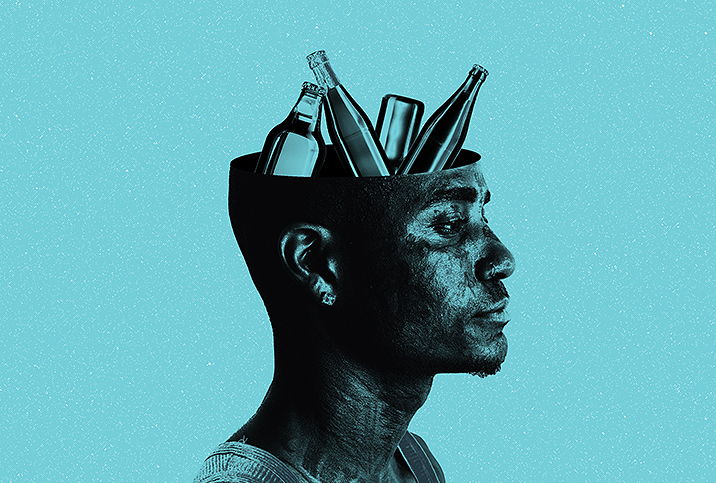The Mental Health Impacts of Addiction

As the daughter of a recovering alcoholic, addiction has been a major part of my life. As a child, my father’s drinking was normalized. It wasn’t until I watched him struggle through rehab that I looked at my habits and realized I also used alcohol to cope with life’s stressors. This pattern of familial drinking corresponds with a family pattern of anxiety and obsessive-compulsive disorder (OCD), so the next logical question is what comes first—the drinking or the mental health disorder?
Does mental health cause addiction?
Research indicates about half of the individuals with a mental health condition will likely develop a substance abuse problem, and half of those with an addiction are often later diagnosed with a mental health disorder.
It’s unclear if one condition causes another, but mental health conditions commonly associated with addiction, such as anxiety, panic and mood disorders, impact the same areas of the brain. Genetic and environmental influences combine to create the perfect storm of stress and stimuli that lead to these dual conditions.
When these mental health conditions develop, they often go undiagnosed, so individuals turn to substances to manage their mental health, which may lead to an addiction.
The mental health impacts of addiction
Unfortunately, while the initial impact of substances to treat mental health symptoms can provide calmness or sleepiness, prolonged usage can have the opposite effect and make mental health conditions worse.
For someone who suffers from anxiety and OCD, like me, alcohol consumption can increase panic-induced episodes, which can include heart palpitations, angry outbursts and obsessive, intrusive thoughts. As time passes, your tolerance will grow, and you'll need larger doses of your preferred substance to address symptoms, which further impairs your ability to function and increases your body’s dependency.
Tom Arnold, actor and comedian, reveals how he recovered from his battle with addition. Watch the full interview here.
Suffering from addiction doesn’t automatically mean you have a mental health condition. However, the effects of substance abuse can induce symptoms similar to a mental health condition such as panic attacks, hallucinations and dramatic shifts in mood. People with a family history or substance abuse or mental health conditions are at higher risk for developing an addiction.
It’s unclear if substance abuse can cause a mental health condition, but many people abuse substances to cope with trauma and stress, so addressing the mental health impacts of addiction as well as the environmental triggers that cause you to abuse substances are essential for recovery.
Mental health impacts on family members
The hardest part of addiction is the impact on our family members. When I decided to quit drinking, I did so to prevent my children from having the same relationship with substances that I did. Looking back on my childhood and early adulthood, when my father’s addiction was at its worst, I realized many of my anxiety and OCD triggers stem from uncertainty and a need for control.
I also have extreme periods of guilt because I never said anything. This guilt runs rampant in my family whenever my father’s addiction is brought up. It’s normal for family members of substance abusers to feel a range of mental health impacts such as anxiety, depression and phobias.
The most chilling statistic is that children of parents with addiction are far more likely to develop anxiety, depression or a mental health disorder later in life, which makes them more susceptible to addictive habits.
Finding help for addiction
Thankfully, finding help for addiction is easier than ever, but treatment is only effective if you or your family member is committed to the treatment. Unfortunately, many people are unable to recognize the impacts of their addiction on themselves and their families.
For many people suffering from addiction, it is not until their family, friends, finances and career are negatively impacted that they begin to understand the severity of the problem. However, if your loved one is suffering from addiction, there are ways to support them without enabling the behavior.


















